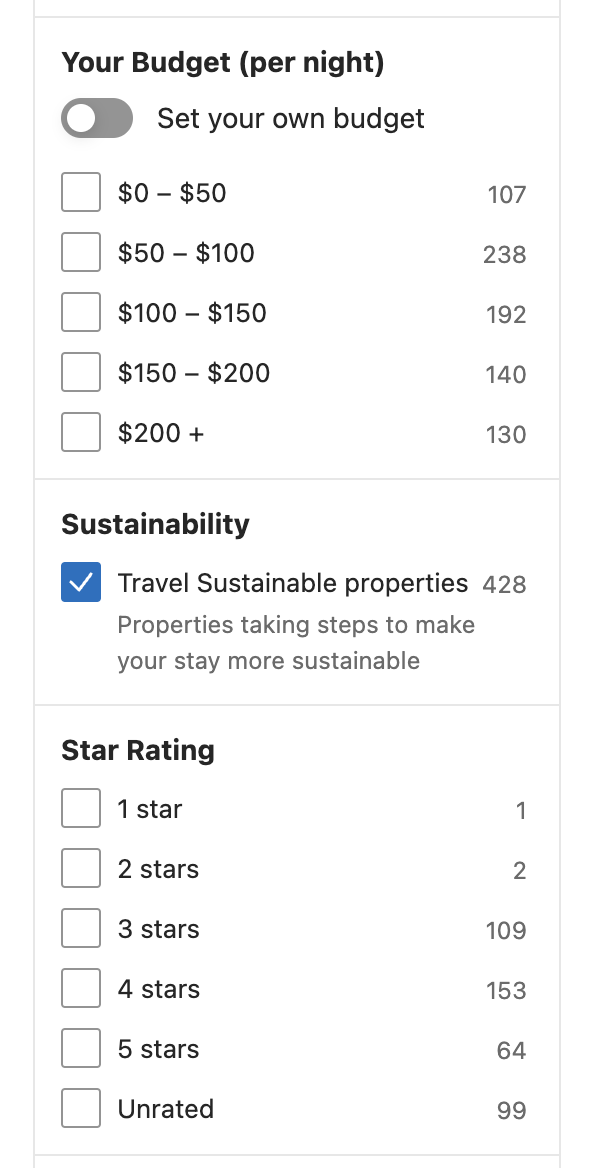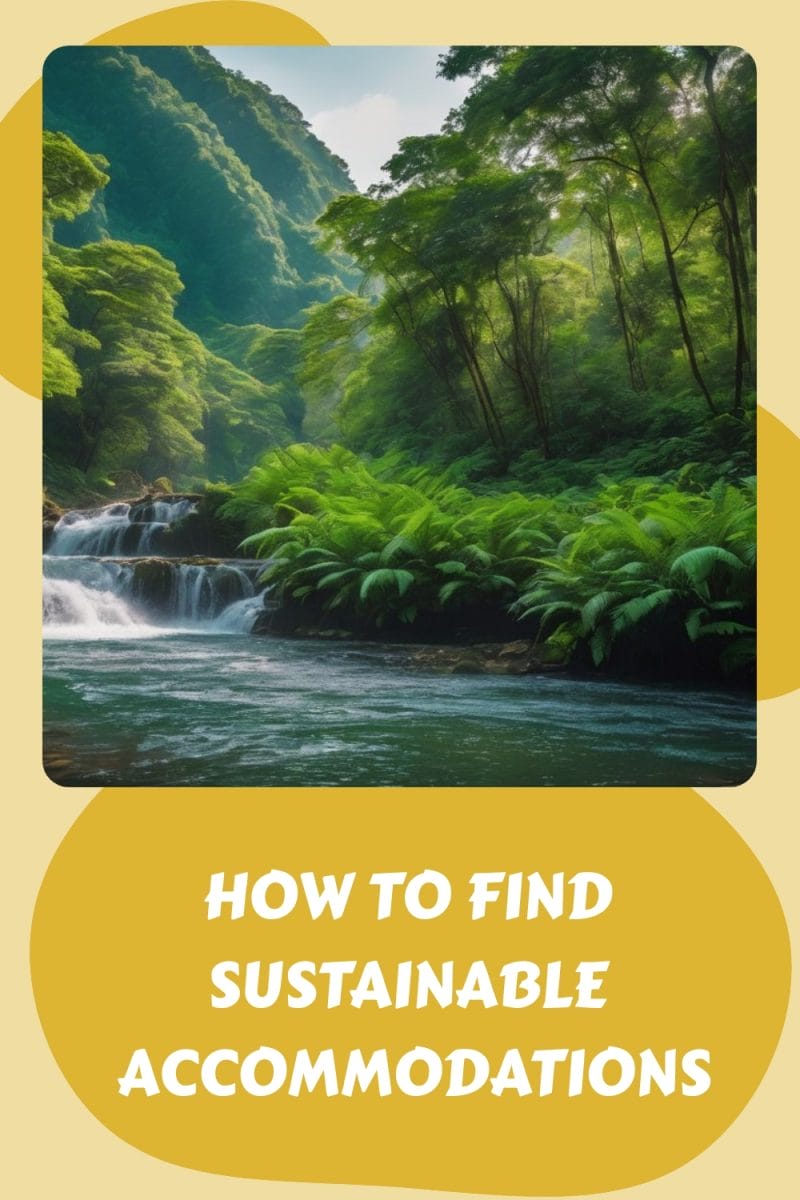The Go-to Travel Planning Guide for Eco-Conscious Travelers
Are you an eco-conscious traveler looking for sustainable accommodations? Choosing green and ethical lodging is an important aspect of sustainable travel, yet can sometimes be challenging.
This comprehensive guide will teach you how to find the best environmentally friendly places to stay while on your travels. From exploring booking websites with sustainability filters, relying on certified labels, and using eco-conscious travel advisors, this article will cover all aspects so globally conscious travelers can be best equipped to book responsible accommodations.
Key Takeaways
- Eco-friendly accommodations prioritize environmental friendliness by using energy-saving appliances and renewable energy.
- Use booking sites that have filters that allow you to search for sustainability.
- Google Travels offers special tools for travelers to search and evaluate accommodation’s sustainability levels.
- Hiring an eco-conscious travel advisor can provide expert advice on sustainable accommodation options.
- Responsible travelers should look for energy efficiency, waste management systems, water conservation strategies & social responsibility commitments during their stays.
What does Sustainable Accommodations mean?

Sustainable accommodations means making conscious choices about the places you stay and to consider the environmental, economic, cultural, and social impacts of your visits.
These kinds of eco-friendly stays prioritize environmental friendliness in their practices, services, and operations. The priority for these accommodations is to reduce their negative impact on the environment like using Energy Star appliances, conservation of water, responsible waste management, and/or renewable energy sources such as solar power.
These accommodations also focus on social responsibility initiatives and supporting local communities through local sourcing of food, purchasing goods from eco-friendly companies, and using environmentally sound cleaning products.
Importance of choosing eco-friendly accommodations
For travelers looking to make a positive impact with their stays, taking the time to research sustainable accommodations is one small move that has a domino impact. You should expect that accommodations that claim to be eco-friendly are typically more sustainable, use green initiatives, and implement positive environmental practices in order to reduce energy consumption and water waste.
Staying at an eco-conscious hotel can also benefit local economies as these hotels will often be locally owned, hire local employees, and provide other benefits that direct your tourism dollars to support the community they are in.
How to Find Sustainable Accommodations

Some of the top travel booking websites offer filters travelers can use to easily search and book sustainable accommodations. After testing dozens in the market, I’ve narrowed down the following websites and methods I find the most trustworthy, efficient, accurate, and easy to use.
Booking.com has been a pioneer in introducing sustainability initiatives to assist travelers in finding eco-friendly accommodations with their comprehensive “travel sustainable” feature.
With this feature, users can be sure that they book a stay that has been vetted as sustainable. All you have to do is check the box for “Travel Sustainable Properties.”
Some of these filters include energy efficiency and renewable energy use, waste management and recycling, water conservation and management, support for local communities and preservation of natural environment as well as commitment to social and environmental responsibility.
Even without applying the filter, you’ll see the Travel Sustainable notation on the main results page of Booking.com.
While it isn’t perfect, this sustainability filter lets you sort through the thousands of results on Booking.com to find hotels that are at least doing better than the rest. And many of the results are big hotel chains!
Use Google Travels’ Accountability Tools
Google Travel’s features and filters to help travelers make more responsible choices when searching for accommodations are built right into the search feature. According to Google, its Accountability Tools allow travelers “to explore energy efficiency and other sustainable features of their potential accommodation” such as renewable energy use, waste management and recycling, water conservation, and support for local communities.
The best part of searching in this way is that you don’t need to take any extra steps in your search to see the eco-friendliness rankings of your flights and accommodations.
Additionally, it helps uncover information regarding a property’s commitment to social and environmental responsibility. By providing personalized sustainability insights on flights and hotel searches these tools can enable eco-conscious travelers access green filters allowing them to find the most appropriate sustainable accommodations according to their criteria in addition the ability of viewing nature-related information about travel choices making it easier for users to make informed decisions with greater awareness of their ecological footprints.

The filter also allows app users review certifications from global hospitality rating agencies ensuring companies are committed achieve sustainability goals giving travellers peace of mind – no matter where they choose stay or fly each individual choice contributes protecting our planet!
Using an Eco-conscious Travel Advisor
Hiring an Eco-conscious travel advisor is the perfect solution for travelers seeking out sustainable accommodations. A travel advisor can provide expert advice, and knowledge, as well as, hand pick eco-friendly accommodation options, suggest places in line with your values, and help you make informed decisions on where to stay that align with your travel needs.
This means you have access to a range of unique properties across diverse locations that are not necessarily offered through online portals; from guesthouses made of recycled materials to treehouse hotels powered by solar energy and organic farms one can volunteer at during their stay instead of opting for more mainstream options.
By turning to a dedicated specialized service provider who understands the need for sustainability when it comes to wherever you are traveling. It also saves you time in researching and planning, including mistakes and things overlooked because as a travel professional, they have access to resources that the average traveler does not.
Additionally, using a travel advisor will enhance the value of your travel experience, giving you the most bang for your buck.
What Are Homestays?
Homestays provide a great sustainable accommodation option for eco-conscious travelers looking to experience a local atmosphere and culture. Rather than staying in large hotels that are often less friendly to the environment, homestays are typically smaller scale accommodations which can help reduce their environmental impact.
In addition, by choosing to stay at an authentic and smallscale homestay, travelers can also support local communities by directly contributing to their economic growth. By using services like Booking.com, eco-minded people will be able to easily find responsibly designed properties with sustainability filters including low-carbon emissions or energy efficiency features such as solar panels or water recycling systems.
Staying in a homestay is much more than just having someplace comfortable and clean — it’s about experiencing an authentic cultural immersion into the community and economy of the place you’re visiting! On top of that, you’ll contribute positively rather than negatively towards our planet’s resources.
The place to start your homestay search is easy enough with Homestay.com. They’ve been around since 2013 and have a great system of matching hosts to short and long-term travelers for stays. this includes students and independent travelers alike.
Sites Specific to Eco-Conscious Travel
Here’s a list of other sites that are specifically for travelers who are looking for responsible accommodations.
- Regenerative Travel (Connecting travelers with independent hotels that are rooted in community to enable people, nature, and culture to thrive. This is the leading marketplace for travel companies dedicated to regenerative hospitality.)
- FairBnB (The co-op and sustainable vacation rental platform that gives back 50% of its revenues to support a local community project of your choice.)
- EcoHotels.com (This site lets you find hotels with a purpose! For every stay, accommodation or hotel booking you make, they plant a tree to help restore the forests!)
- Kind Traveler (The 1st responsible travel platform empowering you to positively impact local communities with 350+ hotel, charity + destination partners.)
Key Things for Your Sustainable Stays Search
To help you make the most eco-conscientious choice for your stay, look out for energy efficiency, waste management programs, water conservation strategies, and sustainability commitments.
Read on to find out more about certified green hotels and other responsible ecotravel options.
Energy efficiency and renewable energy use are key elements for creating a sustainable, eco-friendly accommodation. Ensuring efficient energy consumption helps reduce the environmental impact of accommodations by reducing carbon emissions.
This can be achieved by using LED lighting, motion sensors that turn off lights when no one is present, and other practices that reduce energy waste. Renewable energy sources such as solar panels or home wind turbines can help to power the property more sustainably than relying on conventional electricity generated from fossil fuels.
Oralso offer additional benefits – such as lower energy bills, improved guest comfort, and greater resilience to power outages – making them an attractive choice for hotel owners looking for ways to become more environmentally responsible.
When it comes to sustainable eco-friendly accommodations, waste management and recycling are essential. Waste is a valuable resource which means that disposing of articles in the most efficient way possible is key to ensuring sustainability.
Common waste management practices for hotels include proper collection and separation before moving on to disposal. This involves organizing waste into categories such as paper, metals, plastics, glass etc for easy separation and storage.
Recycling all these materials helps contribute towards reducing reliance on landfills whilst also promoting resource efficiency – both huge steps forward for Hotels and Eco-Travelers alike! Sustainable waste management helps minimize the carbon footprint left behind by travelers while contributing to conservation through powering energy efficient machines such as lights or air conditioners with renewable energy sources like solar power.
Additionally, it can support local communities who may benefit from partnerships with hotels regarding proper recycling programs or initiatives aimed at ecological preservation such as replanting trees where needed.
One of the key components of sustainable accommodations is water conservation and management. Hotels have to consider numerous factors such as how much water they use, where it comes from, how waste water is disposed off, and overallefficient management and usage of this essential resource.
Most hotels implement a variety of innovative measures to reduce their environmental impact like harvesting rainwater for gardening or installation of low-flow appliances such as toilet flushes that use less water than conventional ones.
Many hotels are also investing in refining their wastewater treatment systems with better technology to dispose off sewage properly insteadof releasing it into surface waters without proper treatment.
Such measures go a long way towards preserving natural resources ensuring protection for future generations while also helping hotels save costs by employing efficient tactics resulting in more responsibility towards the environment from them.
One of the best ways to be an eco-conscious traveler is to support sustainable accommodations that focus on ensuring local economic growth and environmental conservation. By choosing accommodations that prioritize community development, you are personally actively contributing towards a more environmentally friendly form of tourism.
Ecofriendly practices such as energy efficiency, water conservation and management, commitment to social responsibility, waste reduction or recycling efforts and preservation of natural resources all make a big difference when it comes to contributing positively towards ecological sustainability initiatives in each destination’s natural environment.
Sustainable certifications can also help travelers identify responsible businesses which adhere to recommended standards evaluating their environmental performance. Examples include Green Key Global for hotels or Ecotourism Australia’s ECO Certification program for tour operators who wish ensure they are running operations with the utmost respect for nature while promoting improvement in the quality of life of their hosts!
When considering options for sustainable accommodations, it’s essential to look into each accommodation’s commitment to social and environmental responsibility. Responsible tourism choices ensure that by choosing eco-friendly lodging you not only avoid compounding the existing environmental issues but actively contribute to preserving natural environments and supporting local communities.
Sustainable accommodations strive towards a variety of things: reducing energy consumption; Wastemanagement & Recycling; Water conservation & management; and promoting social responsibility in the form of ethical practices, transparent business models, as well as initiatives designed to support local communities.
These commitments are often duly certified or labelled with eco awards given by international organizations such Collins dictionary’s most unique listing of “Sustainable Travel Dictionary Words”.
In fact, 73% of global travelers surveyed want their next accommodation choice be more sustainability conscious while 82% of Booking.com’s accommodation partners view sustainability as important or very important (Booking 2021 Sustainable report).
How Important are Certifications and Labels ?
Sustainable certifications and labels can make an enormous difference when it comes to eco-conscious travel, as they provide assurance that businesses meet specific environmental standards.
These certifications are indicators of a company’s commitment to social and environmental responsibility in their operations so travelers can rest assured that the accommodations they use reflect their values.
What’s more, trustworthy green labels also help individuals identify environmentally friendly goods and services for a smoother journey – from water conservation initiatives to waste management systems! Ultimately, these certifications and labels enable eco-conscious travelers to feel more confident ensuring the impact on local communities and natural environment is minimal during their stay.
The Most Reliable Companies that Monitor Sustainable Practices
- Green Key Certification: This certification is awarded to hotels, resorts, and other businesses that demonstrate a commitment to sustainability. It’s the most widely known eco-label in the hospitality industry, with operations in over 75 countries.
- CDP (formerly Carbon Disclosure Project): CDP runs a global disclosure system that enables companies, cities, states, and regions to measure and manage their environmental impacts. They have a focus on carbon emissions, water usage, and forest conservation.
- Global Reporting Initiative (GRI): GRI provides a comprehensive sustainability reporting framework that is widely used around the world, helping businesses and governments to understand and communicate their impact on issues like climate change, human rights, governance, and social well-being.
- Sustainalytics: Sustainalytics is a company that provides high-quality, analytical environmental, social, and governance (ESG) research, ratings, and data to institutional investors and companies.
- The Sustainability Consortium (TSC): TSC is a global organization dedicated to improving the sustainability of consumer products. They develop transparent methodologies, tools, and strategies to drive a new generation of products and supply networks that address environmental, social, and economic imperatives.
How to Make Your Overall Trip More Responsible
Booking where you will stay is only one part of the trip planning. Here are some other elements to consider to round out your trip.
Use Local Guides
Hiring local guides is a great way to engage with local culture and communities while traveling. As travelers, we can learn so much from the people who are actually living and working in our destination country which helps us gain valuable insights into their culture, history, food and other aspects of life which adds a richer dimension to our travel experience.
In addition to that, hiring local guides also contributes directly to the local economy by providing income for locals rather than taking business away from them. Working with knowledgeable tour operators or tourism professionals at your destination country ensures these experiences reach deeper than superficial sightseeing opportunities or token tourist activities.
Local guides can be incredibly helpful when you start looking for more sustainable accommodations that prioritize environmental and social responsibility during your stay as they have an understanding of what’s available in terms of touching approaches like homestays within rural villages or family-run businesses such as restaurants.
Use Local Transportation
Instead of renting a car or using taxis, try public transportation for cheaper reliable transport with minimal emissions.
Buses, trains, trams, bicycles and walking are all great ways to explore your destination without leaving a big carbon footprint. Researching the local transportation system prior to take-off is essential; it’s likely different than in your home country so you don’t want any surprises on vacation! Plus this is considered a more green way of transportation. It helps reduce traffic congestion at popular tourist destinations by spreading out tourists to neighboring towns or areas.
There’s something unique about exploring on foot while not having the additional worry that comes from driving around an unfamiliar city. Financial benefits come along with this commitment too–public transportation is much more cost-effective than taking private cars everywhere!
Learn the Local Language
Learning the local language is an often overlooked part of sustainable and eco-conscious travel. Not only does it help you communicate more effectively with locals, but it can also enhance your experience by offering a deeper cultural immersion.
With knowledge of the language comes respect for local customs and understanding of community development in order to create authentic experiences, support their local economy, and preserve precious heritages.
A great benefit in learning the native tongue is that travelers are able to make more responsible travel choices; such as participating in activities from tour operators who strive to protect natural environments or honor traditional practices.
My favorite way of learning languages is through cultural immersion, and the best app for doing that is Lingq. On LingQ you can develop all 4 major language areas (listening, reading, speaking & writing), its highlight is on learning through input, meaning reading and listening.
Get Travel Insurance
Travel insurance can be a crucial tool for eco-conscious travelers. If you’re in a small remote village, your travel insurance can reduce the burden on that community by providing additional resources to serve the need you have at the time.
This could include anything from volunteering in natural parks to participating in locally-led ecological tours of protected areas, should you need medical attention or evacuation your policy will direct you to resources, and you will not need to rely solely on the local resources for help (even though the local resources will likely be your front line for most immediate resolutions).
Most policies offer access to 24/7 medical service providers who are familiar with local cultures and practices so they can easily advise travelers on how best to receive care safely without putting themselves at risk.
Your Big Takeaway
Sustainable travel is becoming increasingly important for travelers, and choosing sustainable accommodations is just one step in the process.
Sustainable accommodation options range from certified hotels, eco-resorts, homestays, and eco-accommodations; it allows travelers to minimize their impact on the environment while still having a comfortable stay.
Ecofriendly accommodations often use energy efficiently, employ water conservation techniques, and reduce waste in addition to supporting local communities and nature preserves. By taking these steps towards sustainable travel, eco-conscious travelers can support local economies while lessening their carbon footprints.
Choosing responsibly when its comes to accommodation goes a long way towards making each journey more ethical — so take your time researching responsibly made accommodations before heading off on your next big trip!









